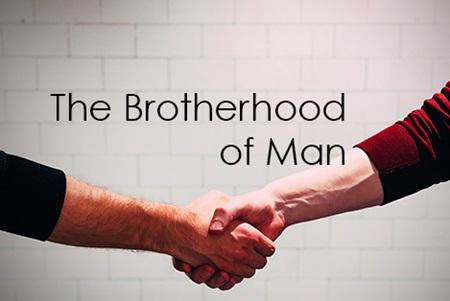Brothers and Sisters
Brothers and Sisters

In this column I have been writing some things about the different names used in the New Testament to describe believers. Another such name is “brother.” This title is used throughout the New Testament and throughout Church history until the present day. Don't we often speak about one another as brothers and sisters?
The name brother indicates that we have the same Father. We are brothers and sisters because God the Father of our Lord Jesus Christ adopted us to be His children. Because you and I are children of God, therefore we are brothers and sisters.
The New Testament was not the first to speak about “brotherhood.” Certain ancient philosophers spoke of human brotherhood – the brotherhood of all mankind. For centuries Greeks had divided the human race into Greeks and not-Greeks. Greeks described non-Greeks as barbarians, inferior to Greeks. Plato and Aristotle shared this view. However, Stoic philosophy, which began its five-hundred-year history as an organized movement around the year 300 B.C., began to make a different sound.
In his Republic, Zeno of Citium (on the island of Cyprus), the founder of Stoicism, spoke of a world-city in which all distinctions of earthly rank would be abolished. In this world city there would be neither Greek nor barbarian. Later Stoic philosophers furthered the thoughts of Zeno. The god Zeus was regarded as the father of all mankind. All men were, therefore, brothers. Epictetus said that a master must deal considerately with his slave because they are both “children of Zeus” (Discourses 1.15). When the apostle Paul spoke with the Stoic philosophers in Athens he showed that he was familiar with their poets who extolled the common childship of mankind through father Zeus (Acts 27:28).
This stream of Greek philosophy proclaimed the universal brotherhood of man. This idea has been alive ever since. It was glorified by the French Revolution whose slogan included “fraternity” (brotherhood) as one of its objectives. Beethoven, impressed by the French Revolution's vision of the freedom and dignity of the individual, exalted this “fraternity” in his Ninth, (Choral) Symphony. In this symphony Beethoven included a prophecy of the time when “all men shall be brothers.”
So, it is not only the New Testament which speaks of the brotherhood of man. Greek philosophy, the French Revolution, brilliant composers do. What is the difference? When Paul said that there is neither Jew nor Greek, slave nor free, barbarian nor Scythian (Galatians 3:28; Colossians 2:11) was he just echoing what Zeno had said 300 years earlier? When Paul told master Philemon to treat his slave Onesimus not as a slave but as a beloved brother (Philemon 16), was he simply parroting Epictetus? What is the difference? What does the New Testament say about brotherhood which is special?
The difference is that the philosophy of the Stoics, the French Revolution and Beethoven sees man as the measure of all things. This philosophy proclaims the universal brotherhood of man because of some supposed intrinsic value, a deep-rooted worth, which man has of and in himself. The New Testament, on the other hand, proclaims a brotherhood of man based upon the value, the worth of Jesus Christ.

Man is the son of God through Adam. As Luke 3:38 says, Seth was the son of Adam, the son of God. However, when man fell into sin, he broke that Father-son relationship between himself and God. Fallen men and women are not the children of God. They are the children of the devil. The Lord Jesus said this about the unbelieving Jews:
You are of your father the devil, and your will is to do your father's desires.John 8:44
That will alert us not to speak of unbelievers as brothers and sisters. Do you want to be a brother to someone whose father is the devil? That will forewarn us not to become enthusiastic about slogans proclaiming universal brotherhood. If there are brothers, there has got to be a father. Who is the father? God or the devil?
Is there a universal brotherhood of man? Yes. All those whom God has included in His covenant of grace are His children. And these children are one another's sisters and brothers. God has brought this about through His eternal Son Jesus Christ. Jesus Christ is the one who brings us into the family of God. He is the great leveller, the One who erases distinctions between people.
Christ abolished the most fundamental human distinction – the one that existed between Jew and Gentile (Ephesians 2:11-22). Christian Jews and Christian Gentiles are brothers and sisters in Christ. Paul told the Galatians that there is neither Jew nor Greek, slave nor free, male nor female, not because of some innate value in man, but because they were all one in Christ Jesus. Paul told the Colossians that among them there could not be Greek and Jew, circumcised and uncircumcised, barbarian, Scythian, slave and free man not because he had read Zeno, which he probably had, but because Christ is all, and in all. Paul told Philemon to treat Onesimus his slave as a brother not because he was impressed by Epictetus but because Philemon and Onesimus were one in the Lord.
Christ is the new Man. He is the Founder of a new human race. Those who believe in Christ are members of that race. They become children of God. As John wrote:
But to all who received him, who believed in his name, he gave power to become children of God; who were born, not of blood nor of the will of the flesh nor of the will of man, but of God.John 1:12,13
Christ is the first-born among many brethren (Romans 8:29). He is not ashamed to call us brethren (Hebrews 2:11ff). If we do the will of God we prove ourselves to be the brothers and sisters of Christ (Mark 3:35).
We confess these wonderful truths in the Heidelberg Catechism. In Lord's Day 9 we say:
… the eternal Father of our Lord Jesus Christ … is, for the sake of Christ His Son, my God and my Father.
In Lord's Day 13 we confess that:
… Christ alone is the eternal, natural Son of God … [and that we] are children of God by adoption, through grace, for Christ's sake.

Through Christ we are children of the Father. We are brothers and sisters of Christ. We are each other's brothers and sisters. The Lord Jesus brings about a profound reconciliation between people who once were enemies. In Damascus there was a disciple called Ananias. He called Saul of Tarsus, whom the Lord had struck with blindness as he was on his way to Damascus to round up Christians, “Brother Saul.” This name for Christians speaks of love which believers are to have for one another (Romans 9:10; 1 Peter 3:8). Sadly, Christians do not always live up to this obligation. Sometimes brothers drag brothers to court. Sometimes they wrong and defraud each other (1 Corinthians 6:1-8).
Let us live up to the deep significance of this title. Let us prove ourselves faithful to one another as brothers and sisters in Christ. Let us show ourselves to be the brothers and sisters of Christ by doing the will of the Father in heaven.
Remember your Creator, the One who has recreated you to be His child and called you to be a brother, a sister, to His other children.

Add new comment